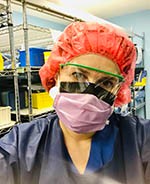Rita Guarino, CST

Student, Second Degree Accelerated BSN, Fitzpatrick College of Nursing
Surgical Technologist, Main Operating Room, Level I Trauma
Nassau University Medical Center, East Meadow, NY
May 11, 2020
Most days and nights are brutal. Some dying patients can see their loved ones through FaceTime or phone calls to say goodbye. Others die alone. Fathers, mothers, sons, and daughters are intubated, side by side. Many members of the same family pass away days apart, no medical intervention able to save them. Some patients’ temperatures skyrocket to 107ºF. I put ice-cold towels on their heads and set up a cooling blanket if a machine is available. In the ICU unit, I witnessed four patients “coding” (going into cardiac or respiratory arrest) at the same time. Patients reach out their hands and I give them mine in return to let them know they were not alone. One day, a young father, in his twenties and intubated, heard me talking beside him and a silent tear began rolling down from his closed eyes – his temperature was 104ºF. Another surgical patient, in his nineties, came in having attempted suicide after recently losing his wife. Eventually, he was diagnosed with COVID-19. I was assigned one-to-one with him. He wanted a hug and reached for my hand. As I held his hand, he rested beside me. The next morning, I hugged him goodbye before he was transferred to another floor. A week later, he died.
I work as a surgical technologist at Nassau University Medical Center in East Meadow, NY. In early March, trauma surgeons and residents were coming into the operating room feeling ill, unknowingly exposed to COVID-19 from the emergency department. On March 18th, the OR nurse manager notified me that on March 8th I had been exposed to a confirmed case of COVID-19. A few days later, I had the nasal swab and tested negative. On March 20th, New York State was forced into coronavirus lockdown. The operating procedures dwindled from elective to emergency only surgeries. Our department began to disperse to other floors to help combat the disease. As the death rate soared, the PPE’s (personal protective equipment) became scarce all over the hospital. We began recycling our PPE’s to last for over a week.
Since the outbreak, my role in the hospital has changed significantly. I am still called back to the OR for Level I emergency cases, but have been reassigned many times. One day, I was floated to a COVID-positive floor working directly with patients. I took pulse oximetry readings, delivered meal trays, filled water pitchers, fed patients, checked vital signs, and logged patients’ resultant values. During another work shift, I was floated to the SPA (step-down unit): repositioning the sheets of very ill patients, rushing to the pharmacy, obtaining blood products, and restocking supplies. For those who died that day, I assisted the nurse with the deceased, getting the mortician bag and transporting the patient down to the morgue. Other days, I was floated to SICU, MICU, CCU, and PACU working with COVID -19 patients who were mostly intubated, performing finger sticks, checking their vital signs, and during code blue writing CPR notes that included all facets of the rescue attempt. COVID-19 forced me to take on all new nonsurgical responsibilities around the hospital.
Despite the crisis, I am honored to work alongside the amazing healthcare workers I get to call my coworkers. They have transcended their role as hospital staff, acting as a family for those in need and as a lifeline for all of us. I greatly appreciate my family, friends, neighbors, and local businesses, who continue to give their love and support. Many meals are donated; homemade masks are given out, and handmade thank you posters are hung up at the parking gates and inside the hallways of the hospital. Inspiring sayings are written on the walkways and the brick walls of the hospital in colored chalk. One night, while driving home on the empty streets of Long Beach, I could hear the quarantined neighbors clapping and cheering for all our essential workers. These incredible acts of kindness have helped us to stay motivated through this horrific pandemic.
These days are filled with a lot of sadness and the road to recovery is long. A dear friend contacted me and asked if I could visit her loved one, a cancer survivor, who was on oxygen for COVID-19. The next day, I ventured up to the COVID-positive floor to check in on him, surprising him with a sweet pastry. While in the room, I made a FaceTime call to my friend. They were ecstatic to see him. Moments like this are representative of the essential little things we all do to support one another. Such a small act, a quick FaceTime, can bring immeasurable joy and peace in such dark times. I heard from my friend a few days later. Her friend was discharged and doing well. I smiled, happy that he had recovered, giving hope to us all. Now, things are slowly going back to normal and the OR staff are back to their department. We are happy to see each other and work alongside one another in the operating room once again. The impact of the virus has changed our lives and is wearing on everyone. As a frontline worker, during this pandemic, I am grateful to see firsthand, how our community has come together to save those most vulnerable and lead with commitment and compassion. I can confidently say, it wasn’t all dark.
